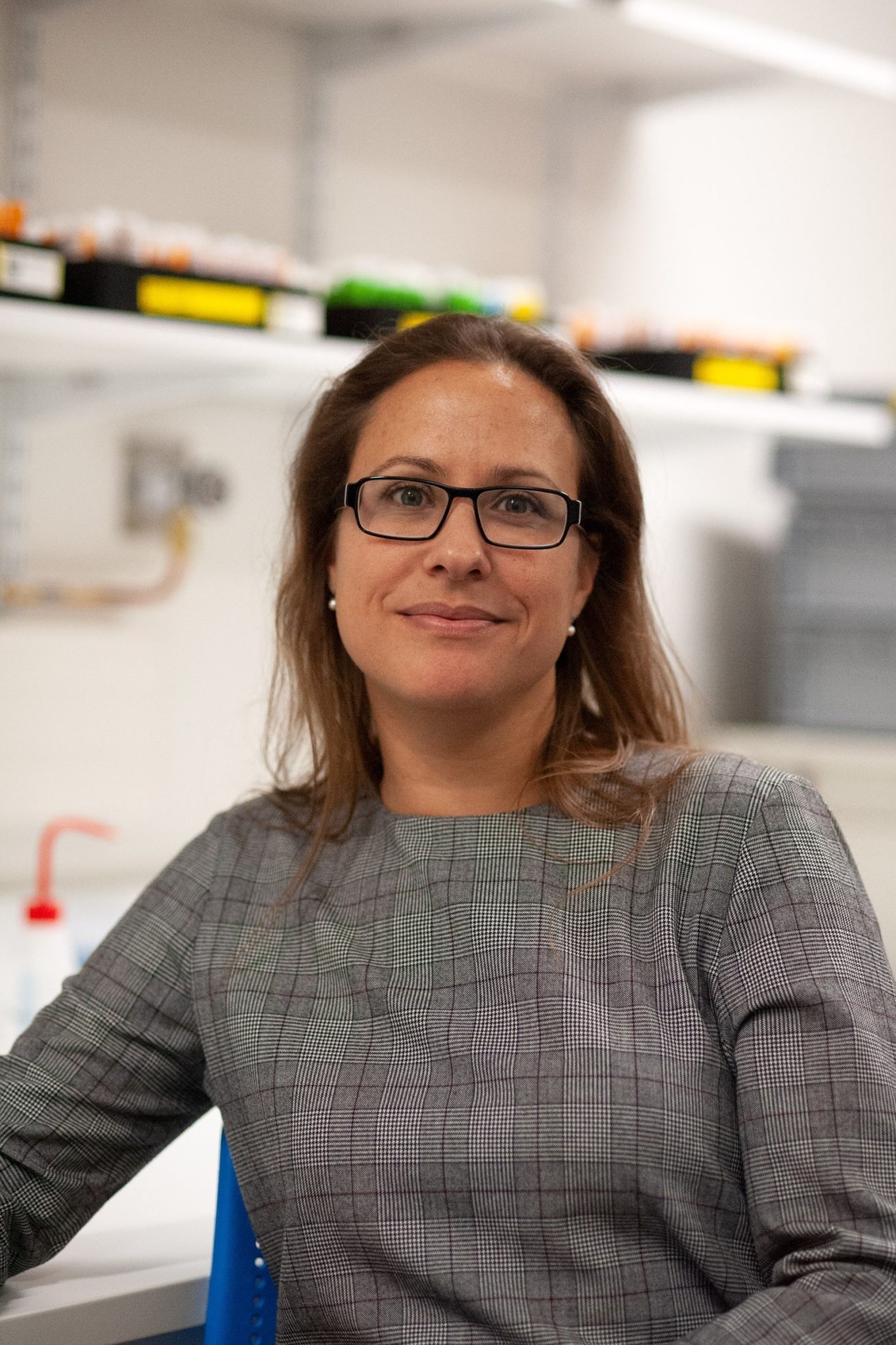
Sandra Soukup
Researcher
/ Université de Bordeaux/ Contact
+ 33 (0)5 33 51 48 34
/ Webpage
http://soukup-lab.eu/
www.orcid.org/0000-0003-2915-919X

Career
I became fascinated with the model organism of Drosophila already in my first steps as neuroscience student, during my Master thesis in the laboratory of Prof. Karl-Friedrich Fischbach (Univ. Freiburg, Germany), where I investigated the Robo-Slit system in axonal pathfinding. During my PhD in the laboratory of Dr. David Gubb (CIC bioGUNE, Spain) I continued using this model to explore the role of necrotic – a serine-protease inhibitor whose closest human homologue is the acute phase serpin α1-antitrypsin – in the innate immune response.
After my PhD I joined the group of Prof. Elisabeth Knust (Max Plank Institute for Cell Biology and Genetics, Dresden), where I dissected a mechanism by which postsynaptic complexes can control presynaptic homeostasis (Curr. Biol. 2013) in the retina. I enjoyed very much the field of synapse homeostasis and neurodegeneration and I moved to Belgium to work in the laboratory of Prof. Patrik Verstreken (VIB/KU Leuven, Belgium) where I made important contributions to the field of synaptic function and neurodegeneration (Neuron 2016). During this time, I participated in teaching activities and supervised and leaded a small team at the same time I developed a network working with local and international collaborators to keep dissecting the role of autophagy at the synapse ((EMBO J 2017).
In 2018 I became a team leader at the Institute for Neurodegenerative disease (IMN) where I obtained a junior IdEx chair. My team aims was to understand why previously healthy neurons start to die during the early onset of neurodegenerative diseases. Therefore we were exploring molecular mechanism of local protein quality control like autophagy and exosome release at synaptic compartments and in the gut brain circuit. To reach this goal we used multidisciplinary approaches including CLEM, super-resolution microscopy, live imaging, giant unilamellar vesciles (GUVs) in Drosophila and human iPSC derived neurons.
Scientific articles
-
Synaptogyrin regulates neuronal activity dependent autophagy to degrade synaptic vesicle components and pathological Tau
prePrint bioRXiv. 2023-07-04.
10.1101/2023.07.04.547658 -
Endophilin-A/SH3GL2 calcium switch for synaptic autophagy induction is impaired by a Parkinson’s risk variant
Autophagy. 2023-04-17. : 1-3.
10.1080/15548627.2023.2200627 -
EndophilinA-dependent coupling between activity-induced calcium influx and synaptic autophagy is disrupted by a Parkinson-risk mutation
Neuron. 2023-02-01.
10.1016/j.neuron.2023.02.001 -
Editorial: Autophagy in the central nervous system: Focus on neurons, glia and neuron-glia interactions
Front. Cell Dev. Biol.. 2022-10-12. 10
10.3389/fcell.2022.1036587 -
Targeting Macroautophagy as a Therapeutic Opportunity to Treat Parkinson’s Disease
Front. Cell Dev. Biol.. 2022-07-06. 10
10.3389/fcell.2022.921314 -
EndophilinA-dependent coupling between activity-dependent calcium influx and synaptic autophagy is disrupted by a Parkinson-risk mutation
. 2022-04-30.
10.1101/2022.04.29.490010 -
Endophilin-B regulates autophagy during synapse development and neurodegeneration
Neurobiology of Disease. 2022-02-01. 163 : 105595.
10.1016/j.nbd.2021.105595 -
Altered autophagy on the path to Parkinson’s disease
Autophagy in Health and Disease. 2022-01-01. : 271-286.
10.1016/b978-0-12-822003-0.00006-1 -
Macros to Quantify Exosome Release and Autophagy at the Neuromuscular Junction of Drosophila Melanogaster
Front. Cell Dev. Biol.. 2021-11-15. 9
10.3389/fcell.2021.773861 -
The role of lipids in autophagy and its implication in neurodegeneration.
CST. 2020-07-13. 4(7) : 167-186.
10.15698/cst2020.07.225 -
Parkinson’s disease: convergence on synaptic homeostasis
EMBO J.. 2018-07-31. 37(18) : e98960.
10.15252/embj.201898960 -
The SAC1 domain in synaptojanin is required for autophagosome maturation at presynaptic terminals.
EMBO J.. 2017-03-22. 36(10) : 1392-1411.
10.15252/embj.201695773 -
EndoA/Endophilin-A creates docking stations for autophagic proteins at synapses
Autophagy. 2017-02-15. 13(5) : 971-972.
10.1080/15548627.2017.1286440 -
Endocytosis and Synaptic Function
Parkinson's Disease. 2017-01-01. : 207-243.
10.1016/b978-0-12-803783-6.00007-9 -
A LRRK2-Dependent EndophilinA Phosphoswitch Is Critical for Macroautophagy at Presynaptic Terminals.
Neuron. 2016-11-01. 92(4) : 829-844.
10.1016/j.neuron.2016.09.037 -
Endophilin-A Deficiency Induces the Foxo3a-Fbxo32 Network in the Brain and Causes Dysregulation of Autophagy and the Ubiquitin-Proteasome System.
Cell Reports. 2016-10-01. 17(4) : 1071-1086.
10.1016/j.celrep.2016.09.058 -
Fast and efficient Drosophila melanogaster gene knock-ins using MiMIC transposons.
G3. 2014-10-08. 4(12) : 2381-2387.
10.1534/g3.114.014803 -
PIWIL1 protein power targets tau therapy
Nat Neurosci. 2014-03-01. 17(3) : 334-335.
10.1038/nn.3659 -
DLin-7 Is Required in Postsynaptic Lamina Neurons to Prevent Light-Induced Photoreceptor Degeneration in Drosophila
Current Biology. 2013-07-01. 23(14) : 1349-1354.
10.1016/j.cub.2013.05.060 -
Uptake of the Necrotic Serpin in Drosophila melanogaster via the Lipophorin Receptor-1
PLoS Genet. 2009-06-26. 5(6) : e1000532.
10.1371/journal.pgen.1000532
